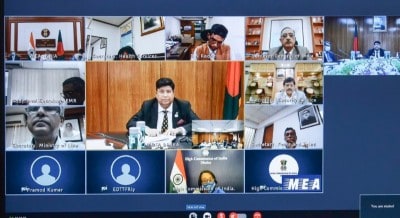



 By Sumi Khan
By Sumi Khan
Dhaka, Sep 29 : India and Bangladesh have underscored the necessity of early resolution of the Teesta water sharing issue and early resolution of agreements on sharing of waters of all common rivers.
The two sides also agreed to hold a virtual meeting of the Prime Ministers in December 2020, at the sixth meeting of the foreign ministers’ Joint Consultative Commission (JCC) held in a warm and cordial atmosphere on Tuesday.
Both neighbours also agreed to establish Bangabandhu-Bapu digital museums both in Bangladesh and India. The Indian government would also release a commemorative stamp on the birth centenary of ‘Bangabandhu’ Mujibur Rehman on December 16, 2020 to pay homage to the life and ideology of the founder of Bangladesh.
Secretaries and high-level representatives from a large number of ministries and divisions of both countries joined the meeting. Although it was Dhaka’s turn to host the meeting, due to the COVID-19 situation, the meeting was held on the virtual platform.
Both sides underscored the necessity of early resolution of the Teesta water sharing and early resolution of agreements on sharing of all common rivers.
The two sides also agreed to hold the long-pending Joint Rivers Commission meeting soon at the ministerial level to address outstanding issues on water resources cooperation.
The two foreign ministers – A.K. Abdul Momen and S. Jaishankar – jointly unveiled two commemorative stamps as part of the celebration of the 150th birth anniversary of Mahatma Gandhi.
The JCC was co-chaired by Momen and Jaishankar.
During the meeting, the two foreign ministers reviewed and discussed the entire gamut of bilateral relations including cooperation on connectivity, security, political issues, development, trade and investment, power and energy sector and people-to-people contacts.
Both sides expressed satisfaction that even during the current situation induced by the pandemic, Bangladesh and India have maintained robust engagement.
The two foreign ministers recognised the positive trajectory of bilateral relations enjoyed by the two countries and exchanged gratitude with each other for maintaining the gesture of good neighbourliness.
In the backdrop of the pandemic, both sides discussed collaboration in the health sector especially in terms of supply, delivery, distribution and co-production of COVID-19 vaccine.
Bangladesh appreciated India’s assurance on prioritising Bangladesh for supply of a potential Covid vaccine in the future.
Both sides agreed to jointly celebrate the golden jubilee of the independence of Bangladesh and the 50th anniversary of the establishment of diplomatic relations between the two countries.
A number of programmes were proposed to be organised jointly to mark the two epoch events, such as revival of the historic Mujibnagar-Kolkata road, honouring the Indian war veterans, ceremonial military parades on December 16, organising friendship fairs, year-long seminars in different cities of Bangladesh and India and simultaneous launching of a website on 50 years of victory and friendship.
The two ministers stressed on the need for strengthening effective implementation of the Coordinated Border Management Plan.
The Bangladeshi side expressed concerned at the rise in deaths of Bangladeshi nationals in border areas.
Indian side agreed that the loss of civilian lives at the border is a matter of concern. Both sides urged the concerned border forces to enhance coordinated measures to bring down border incidents to zero.
The two ministers positively reviewed the possibilities of resumption of air connectivity, during the ongoing pandemic, through special air bubble arrangements with equal share of frequencies and routes by the carriers of the two countries.
Bangladesh requested the Indian side to reciprocally ease visa and land border restrictions for Bangladeshi nationals, particularly for medical patients and students enrolled in various educational institutions of India.
Bangladesh also thanked India for the concessions being provided under South Asian Free Trade Agreement.
However, various non-tariff barriers and lack of adequate trade facilitation is impeding flow of Bangladeshi products into India, particularly the northeast.
Bangladesh requested the Indian side to address issues of accreditation, certification, standardisation, port restrictions and developing port infrastructure to enable exports of Bangladesh into India.
The Bangladesh Foreign Minister requested his Indian counterpart to look into the export of essential commodities, such as onions, by India since this impacts the domestic market of Bangladesh.
Bangladesh also stressed on the equitable application of investment policies by India.
Both sides discussed implementation of the development projects under Indian Lines of Credit in a timely manner.
A high-level monitoring committee was agreed to be formed with Secretary, ERD and Indian High Commissioner in Bangladesh leading the committee on each side.
Enhancing cooperation on energy and power sector through facilitation of tripartite power-energy cooperation among Bangladesh-India-Nepal and Bangladesh-India-Bhutan was also discussed.
During the meeting, the Bangladesh Foreign Minster expressed hope that as a non-permanent member of the UN Security Council, India would play a more meaningful role for a lasting solution to the Rohingya crisis, including their early repatriation to Myanmar in a safe and sustainable manner.
Disclaimer: This story is auto-generated from IANS service.

